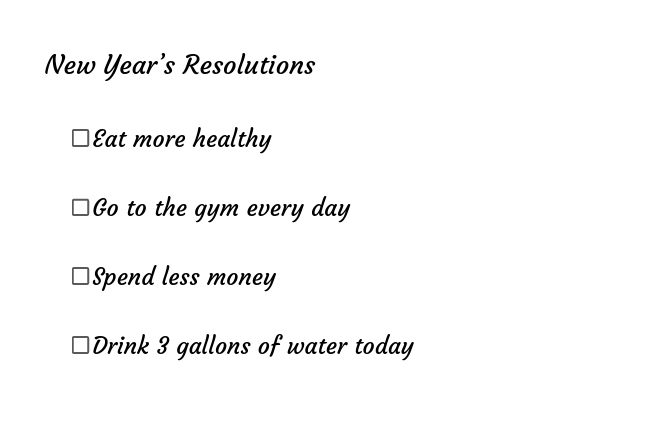New Year’s resolutions are a common subject as January 1 rolls around each year. What people do not realize is that this practice is not just a trivial, modern way for people to try to better themselves. It actually has a history dating back thousands of years.
Picture this: ancient Babylon, in mid-March, during the religious festival called Akitu — their version of a New Year celebration. People took this time to make promises to their gods in the hope to be granted favors in return. They feared that they would fall into bad favor with the gods if they failed on their promises.
In ancient Rome, a similar practice occurred when Julius Caesar reigned. He changed the calendar to establish January as the beginning of the year, as the god “Janus” symbolically reflected on the past year and coming future. They offered sacrifices and once again, made promises.
Over time Christians took on the tradition in their religions. They took the New Year as a time to pray and reflect. The founder of Methodism, John Wesley, formed the Covenant Renewal Service: a “watch night service” on New Year’s Eve that was a sort of religious alternative to the usual energetic celebrations.
Today most people practice the tradition, religious or not, and there is no focus on a certain god. Mostly these “promises” are things we make for ourselves, not any gods or deities. Now that New Year’s resolutions are mostly used for people to set new goals for themselves in light of a fresh year beginning, are they really helpful? Or are they just unnecessary and sometimes discouraging?
Pros and Cons
Having ambitions and goals is definitely important for people to grow in whatever ways they want. However, it is common for people to make big resolutions on January 1 and then quickly forget them as the year moves on.
“My main New Years’ resolution for the year is to drink more water and work on my self-confidence. Usually, these resolutions do not actually help, unless I really set my mind to it. I like making more short-term goals when I feel motivated rather than having to come up with bigger ones at the beginning of the year,” said Finch Garcia, a junior at Leesville Road High School.
“I forgot to make New Year’s resolutions beforehand so I tried to think of something quickly before the new year,” said Martha Johanna, a junior at Leesville. “The biggest thing that I wanted to change about myself and my lifestyle is to be on my phone less. I catch myself scrolling through Tiktok or Instagram for hours sometimes even though I could use my time way better. However, I forgot about this goal a few weeks into the month.”
She also is one of many who have trouble remembering her resolutions for the new year. “I think it would be easier to just start right away when you notice something you want to change. Why waste time and wait for the new year if you would have solved your problem by then?” said Johanna. “I think most people are too hard on themselves with their resolutions and set unrealistic goals for them. It’s better to make small changes that add up than to want to change drastically, get frustrated, and eventually stop.”
While New Year can be a fun celebration, sometimes people may feel pressure with the “new year new me” mentality that often takes over.
In reality, the beginning of January is just the beginning of another month. It does not have to be this grand beginning, and there are 365 days until the next year: plenty of time to make goals, break them, start new ones, and eventually find success.

Hi! My name is Gretchen and I am a senior editor and SEO editor for The Mycenaean. I love to travel and listen to music.

Leave a Reply